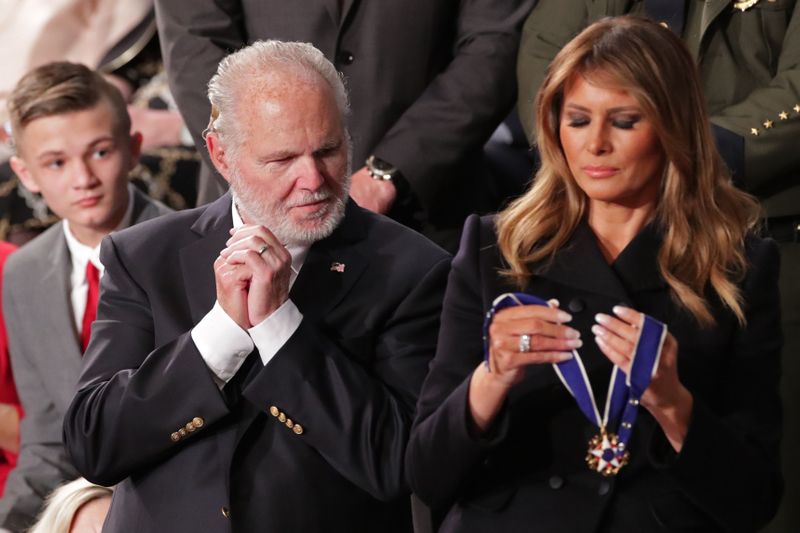By Richard Cowan, David Morgan and Patricia Zengerle
WASHINGTON (Reuters) - Donald Trump on Tuesday used his State of the Union speech to award the highest U.S. civilian honor to polarizing radio show host Rush Limbaugh in one of several attention-grabbing moments staged by the former reality TV star-turned-president.
Addressing an emotional Limbaugh, who was sitting next to first lady Melania Trump in the House of Representatives chamber, Trump said he was awarding the presidential Medal of Freedom "in recognition of all you have done for our nation."
Some Democratic lawmakers were heard groaning "oh no" in response to the award for Limbaugh, a leading voice of the political right who for decades has been at the center of the country's culture wars.
Limbaugh told radio listeners on Monday that he had been diagnosed with advanced lung cancer.
He has been a nemesis of the American left since the launch of his pioneering show in 1985 during the Republican revolution of President Ronald Reagan. For years Limbaugh has helped to shape the party's agenda in the media.
Much of Limbaugh's appeal has been ascribed to his brash, colorful style and his delight in baiting liberals.
The Republican president did not wait to place the medal himself around Limbaugh's neck, part of a White House tradition, and instead had Melania do the honors while Republican lawmakers applauded and cheered.
The awarding of the medal to Limbaugh was one of several divisive moments in a night when theatrics overshadowed the policy announcements that traditionally feature in the annual presidential speech.
While Trump skated quickly through some policy proposals, he also invoked the names of American folk heroes, such as the old-time lawman Wyatt Earp, frontiersman Davy Crockett and sharpshooter Annie Oakley.
In one of the most dramatic moments, Trump orchestrated a surprise reunion between a soldier who had been deployed to Afghanistan and his wife and two children, who Trump said, "have not seen their father's face in many months."
Trump turned his back on House Speaker Nancy Pelosi, the leading Democrat in Washington, when she tried to shake his hand before he spoke. When he concluded, Pelosi ripped up her copy of the speech behind his back.

One audience member shouted at Trump and was removed from the House chamber as the president spoke in defense of gun rights. He was Fred Guttenberg, whose 14-year-old daughter was killed in a Feb. 14, 2008, massacre at Marjory Stoneman Douglas High School in Florida.